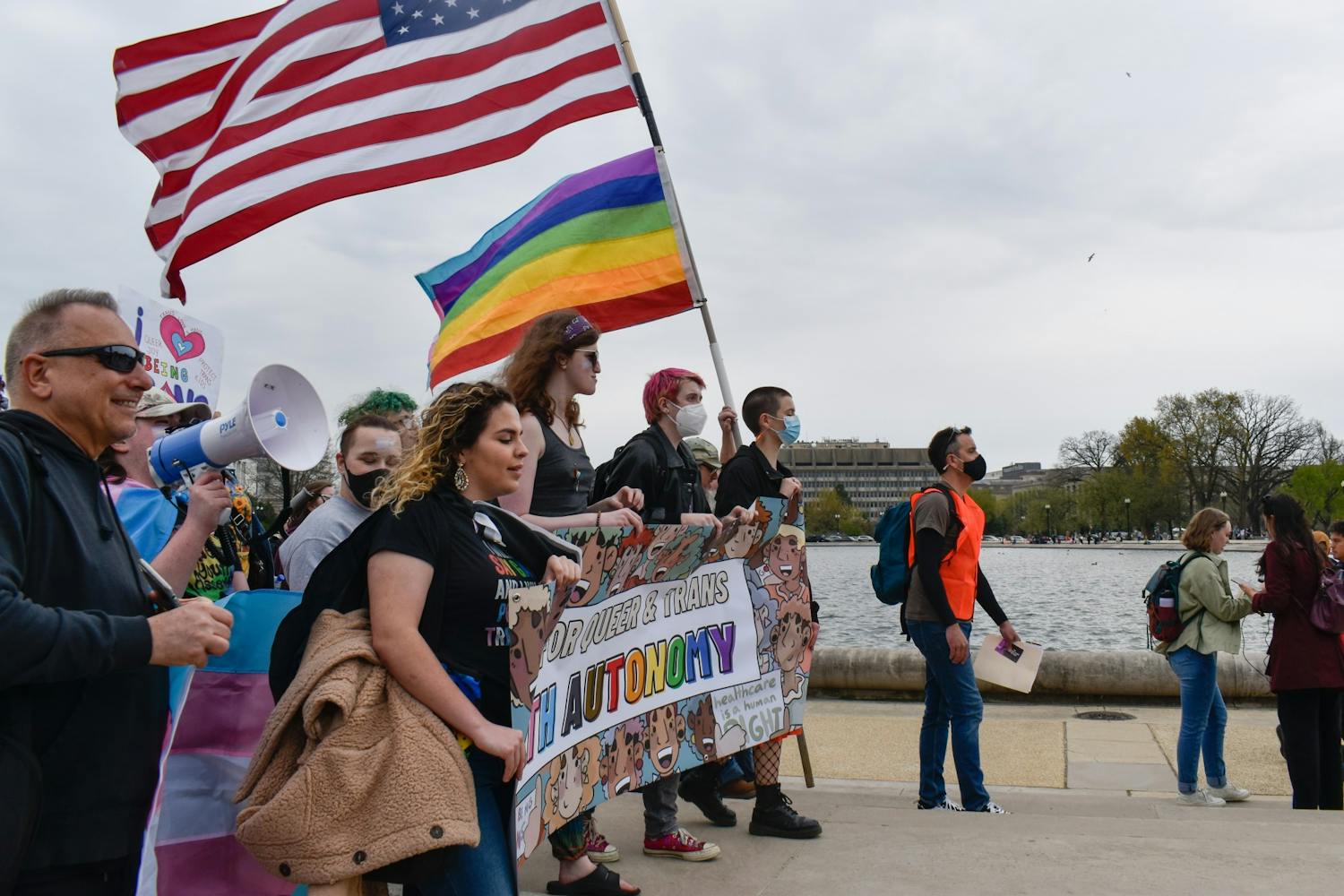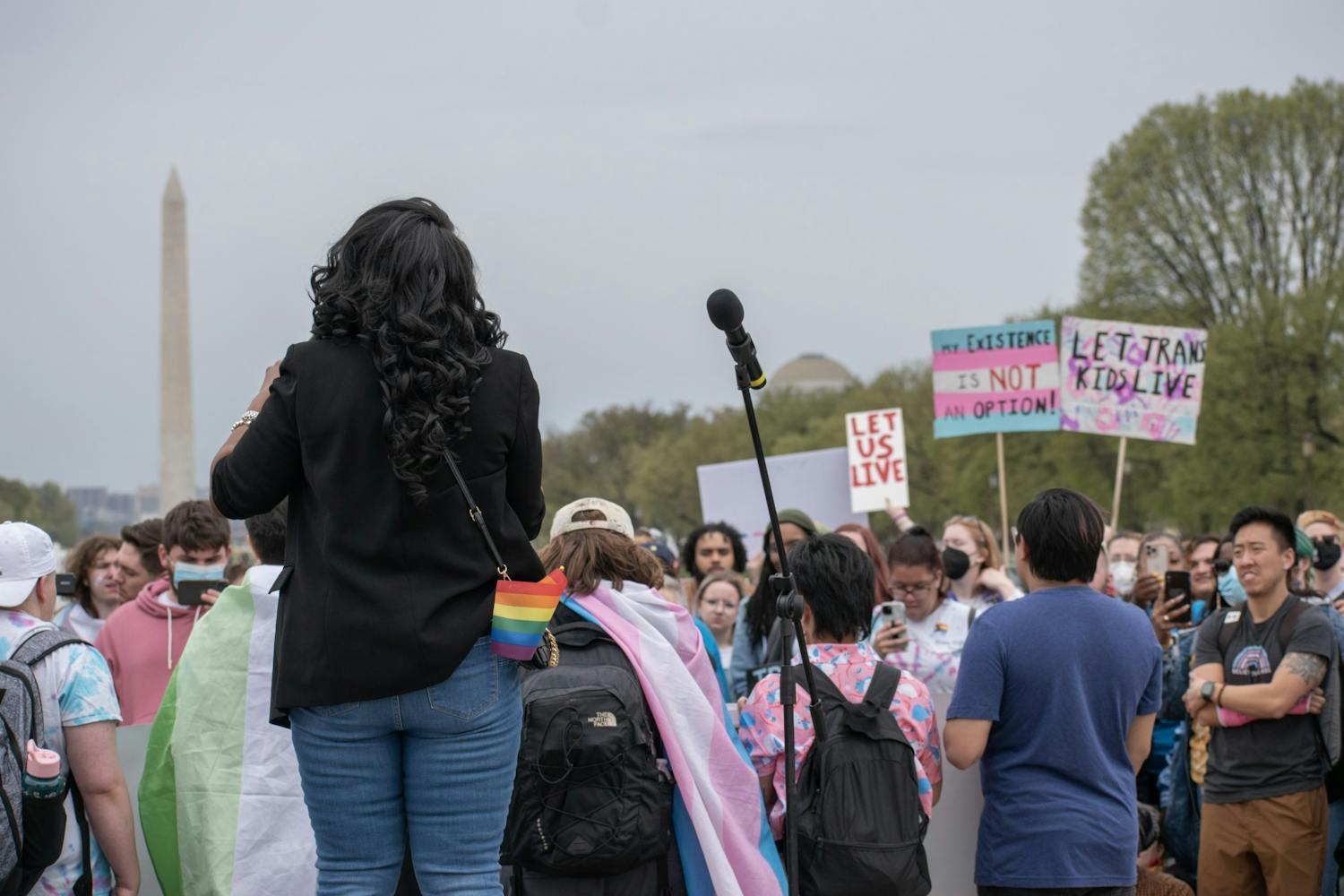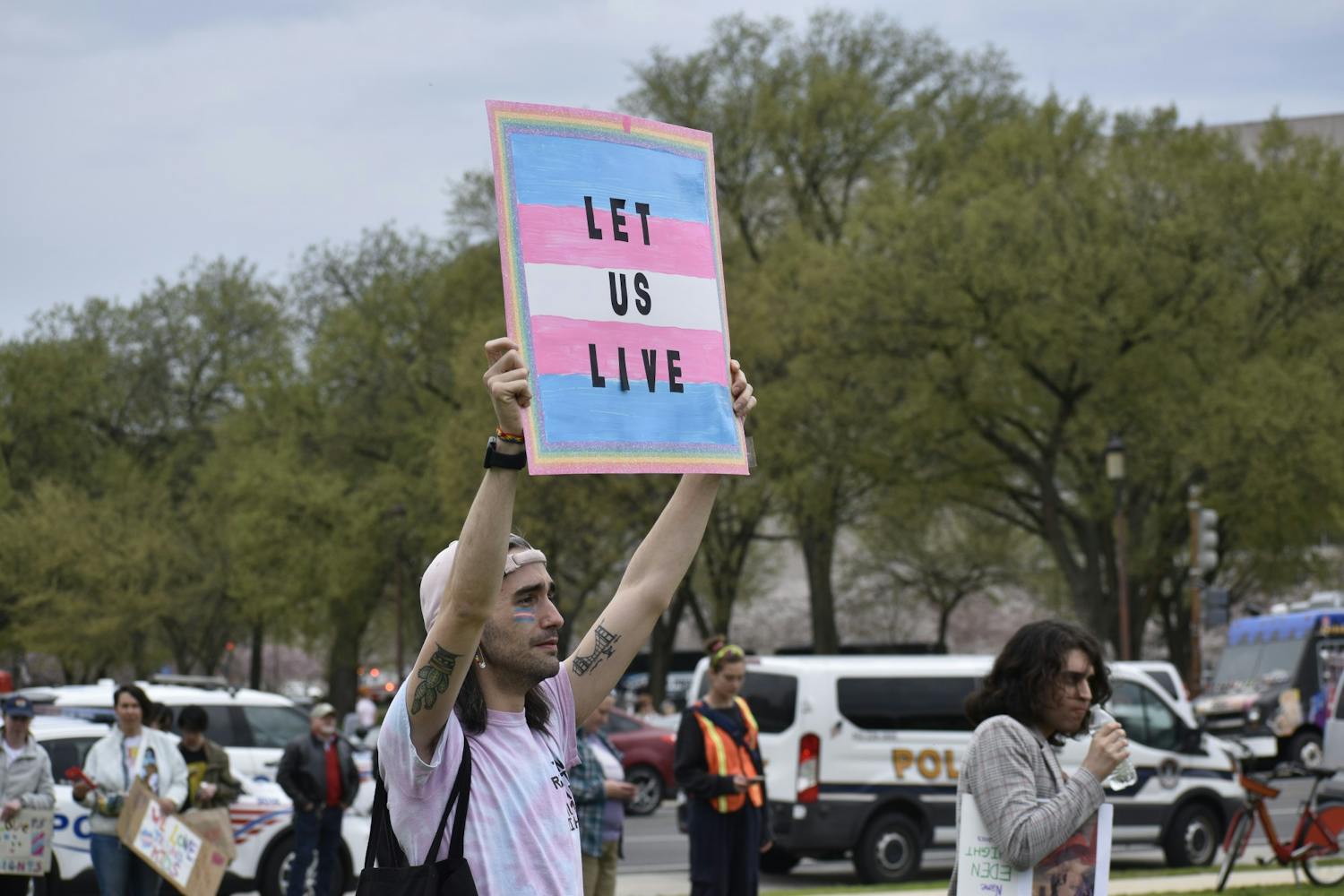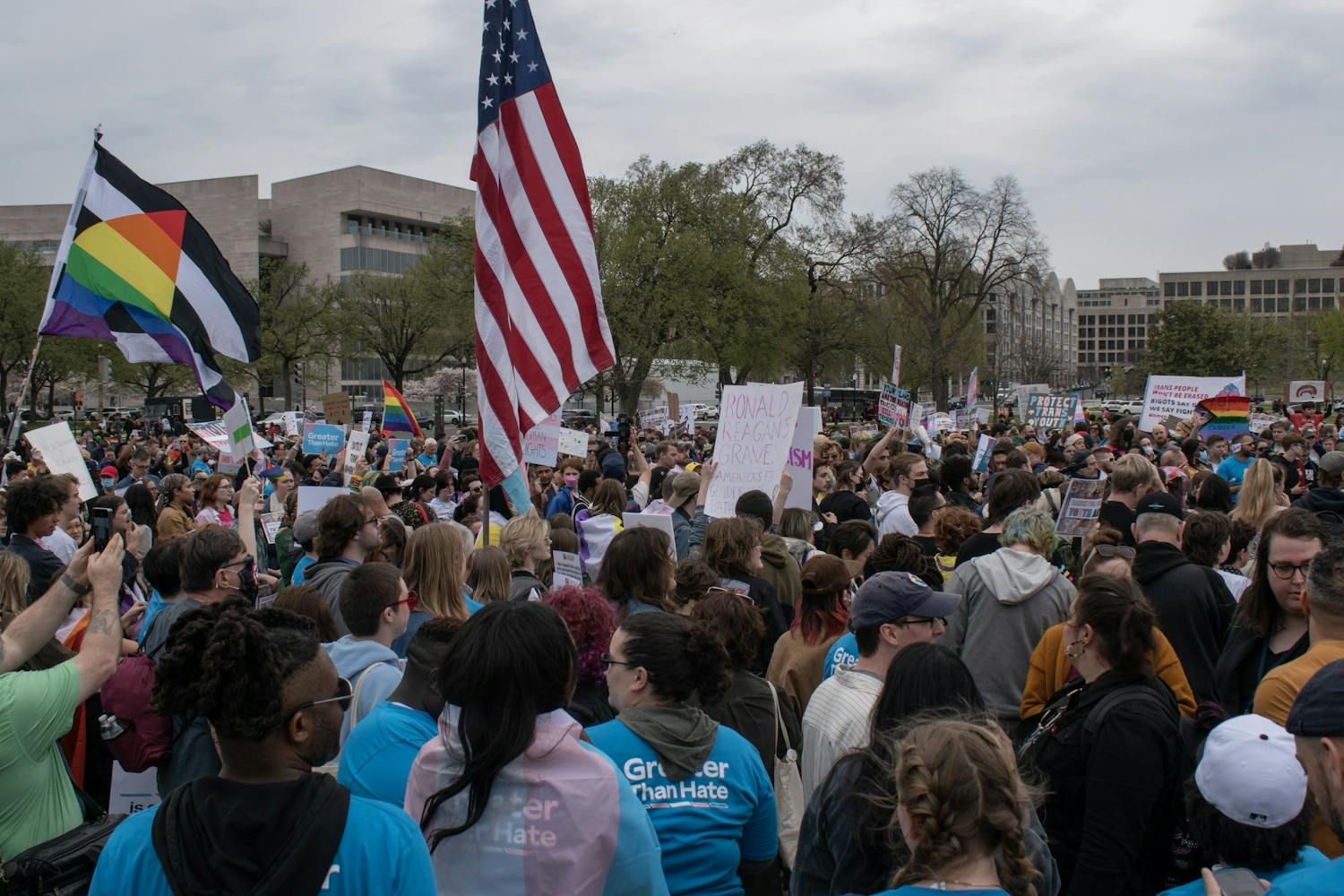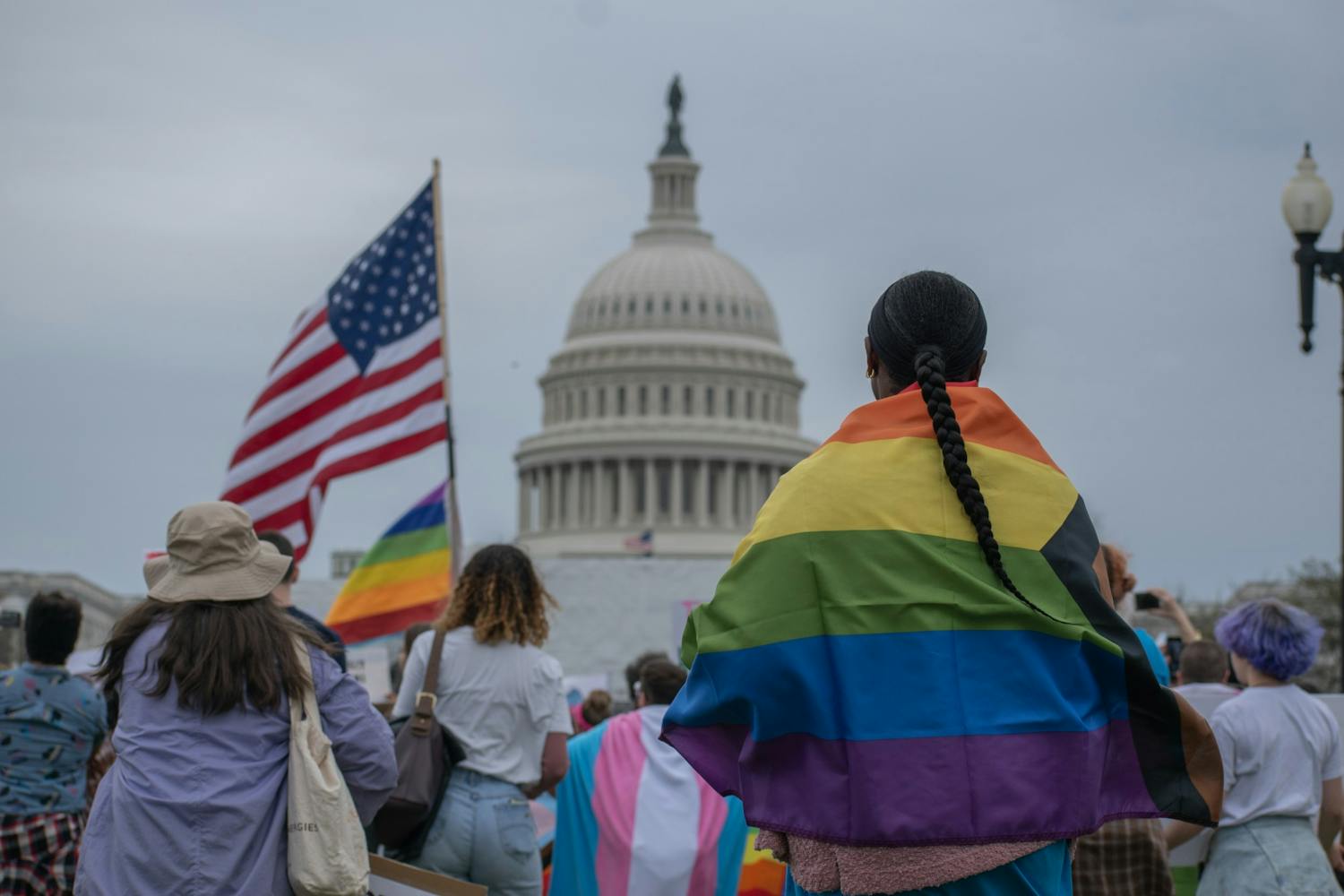Hundreds of demonstrators gathered at Capitol Hill on March 31 to advocate for the LGBTQ+ community as part of a nationwide protest organized by Queer Youth Assemble in honor of Transgender Day of Visibility.
The event, which began as a march from Union Station to the Capitol, was one of several protests, walkouts and rallies conducted across almost all 50 states on March 31 to oppose growing attacks on LGBTQ+ rights in state legislatures. Speakers at the Capitol Hill rally addressed the struggles that LGBTQ+ individuals have endured while offering cries of hope for a better future.
“This is a heavy time, a frightening time and a necessary time to speak up,” Alia Cusolito, the co-president of Queer Youth Assemble, said.
Queer Youth Assemble is an LGBTQ+, youth-led nonprofit organization that serves youth under 25 years old in the U.S. by striving to create “an inclusive and transformative world for queer youth,” according to their website.
The event’s speaker list comprised 17 activists, artists and leaders who are working to build a more equitable future for LGBTQ+ people and other marginalized communities. Although the speakers’ ages ranged widely — with some as young as 15 years old — each emphasized the importance of remaining proud and united in the face of hate.
“We march to raise awareness of the fact that our community is under attack,” speaker and activist Faith Cardillo said. “In order to prevent more of this legislation, we must unite together, raise our voices and stand up for what is right.”
According to data from the American Civil Liberties Union, over 120 bills restricting LGBTQ+ rights have been introduced nationwide so far this year, many of them particularly targeting transgender youth in areas including school sports, freedom of expression and access to healthcare.
Some transgender and nonbinary speakers, like singer-songwriter Ryan Cassata, used their stories as proof that gender-affirming care can be lifesaving.
“Top surgery was an act of self-love,” Cassata said of the procedure he underwent during his transition. “It stopped me from hurting myself. It stopped me from ending my life. It made me want to live again. … Now these trans youth living in states that are banning health care, they will have to wait even longer and waiting for lifesaving surgery is often impossible.”
Speaker and activist Jazz Jennings, known for documenting her journey of living as transgender on the TLC show “I Am Jazz,” doubled down on the significance of providing gender-affirming care to transgender youth.
“I am a testament that many of the arguments made towards the queer community are based on falsehoods,” Jennings said during her speech. “So many people think that gender-affirming care is harmful to kids, but it’s actually the opposite. I’m living proof that medical care is necessary for youth.”
A study published in the Journal of the American Medical Association found that gender-affirming medical care was associated with lower odds of depression and suicidality among young transgender participants. In the study, teenagers who had access to puberty blockers or gender-affirming hormones were 60 percent less likely to experience moderate to severe depression and 73 percent less likely to contemplate self-harm or suicide.
The speakers’ stories resonated with many protest attendees, some of whom expressed worry for the younger generation of transgender youth forced to develop their identities in a hostile political climate.
“I know what it was like growing up in high school being trans and not feeling super comfortable,” Logan Turner-Mannix, a junior at Towson University, said. “Knowing that trans kids in high schools are having it even worse is really terrifying.”
Many speakers expressed their wish that the protest, representative of larger advocacy efforts, will show trans youth who might feel alone that there are people fighting for them.
“It’s so scary to glance at the news and see one or two or 10 new bills per day that are causing actual harm to you and your community,” speaker Sameer Jha, founder of The Empathy Alliance, said to the crowd. “It can feel like there’s no one in your corner. I know I felt like that. But behind each of those bills is a coalition of people working to strike them down.”
To assist this cause, some protesters said they are trying to create their own safe spaces for LGBTQ+ youth. Izzy France, a sophomore at Laurel Ridge Community College said they hope to establish a pride organization in their hometown of Front Royal, Virginia to give others the support they wish they had received as someone who is nonbinary.
“I want to make the world a better place for people like [me] and anybody, really,” France said. “We’re a long way from where we should be, but we’re making good progress.”
Cassata echoed this sentiment, encouraging listeners to stay strong for others in their community.
“All over this country, there are queer and trans people living in fear for their lives, living in fear at school, at home, with absolutely no safe place,” Cassata said. “They need to see us be brave, they need to see us be proud, they need to see us living, so they know that life is possible.”
As part of their effort to call attention to anti-transgender policies, Queer Youth Assemble compiled a list of demands for legislators, which includes a call to require all states to form a statewide commission on LGBTQ+ youth “that will assist with policy, professional development and queer and trans youth empowerment.”
Other items on the list demanded that teachers undergo LGBTQ+-specific diversity and equity training, that schools fund at least one designated and functional gender-neutral bathroom and that the use of conversion therapy be banned for people of all ages nationwide.
While acknowledging their progress, speakers like Cardillo emphasized that the protest is only the beginning, while calling on politicians to deliver on their duty to serve their queer and trans constituents.
“I am here for all of the students who said they’re scared to live their lives; no one should ever have to face that,” Cardillo said at the event. “To every single federal, state and local representative: all eyes are on you. We need your help to keep us safe. We will vote you out because our lives depend on it.”
Daniel Trujillo, a 15-year-old transgender activist, offered words of action for his generation, saying he “refuses to go backwards.”
“Call your lawmakers, write your newspapers, speak up and speak out wherever you can,” Trujillo said. “Use your power for good. Use it for our future and use it for unity. Together, we are greater than hate and together we will win.”
This article was edited by Zoe Bell, Jordan Young and Nina Heller. Copy editing done by Isabelle Kravis, Leta Lattin, Luna Jinks, Sarah Clayton and Stella Guzik.

